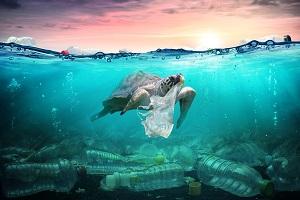The majority of the ocean’s pollution originates from land-based sources and is washed into the ocean through rivers and other waterways. Turning the tide on marine pollution requires global action, and transboundary cooperation over shared waters forms part of the much-needed solution.
Maritime pollution needs to be tackled at the source, upstream: protecting rivers, creeks, drainage systems and groundwater is critical to protect the ocean. The Water Convention Secretariat is rising to the challenge: in cooperation with key partners, the Secretariat convened a side event at the High-level Political Forum on Sustainable Development (HLPF) and will organize a global workshop on source-to-sea management, later this year.
These events are happening at a time when the international community is stepping up its commitment towards healthy oceans and sustainable water management. The Lisbon UN Ocean Conference 2022 took place last month, and the global community is now busy preparing for the UN 2023 Water Conference which will review the progress on the Water Action Decade’s objectives. This year’s High-level Political Forum on Sustainable Development prominently featured SDG14 (Life below Water) among its focus SDGs and the upcoming UN Climate Change Conference (COP27) will dedicate an entire day to discuss water issues. In sum: sustainable water management and healthy oceans are gaining prominence on the international agenda.
While the 2030 Agenda is indivisible by nature and no SDG can stand on its own, the truth is that the freshwater (SDG 6) and maritime (SDG 14) communities are largely fragmented. More coordination, exchange and partnerships need to follow. The source-to-sea approach aims at bridging these gaps by connecting land, freshwater, coastal and marine environmental management. It is an approach to tackle the pollution crisis as well as the biodiversity crisis.
The role of the Water Convention is critical, since more than 60% of freshwater resources worldwide are shared by two or more countries. The Water Convention is dedicating one of its programme areas to promoting integrated water resources management in transboundary basins – Estonia and Slovenia are the lead parties for this programme area and among the key partners for the source-to-sea activities under the Water Convention.
The discussions started at the HLPF side event exemplified the value of integrating across the source-to-sea system. The partners involved in this work – Estonia, Slovenia, SIWI, GEF, IW:Learn, GWP, UNEP MAP – will support the preparations for the upcoming global workshop on source-to-sea management in December 2022. It will provide a platform to discuss practical steps of acting not only across sectors, but also across countries. The Water Convention is the natural platform to build bridges between sectors and countries – and thereby helps to contribute to sustainable water management and healthy oceans.


